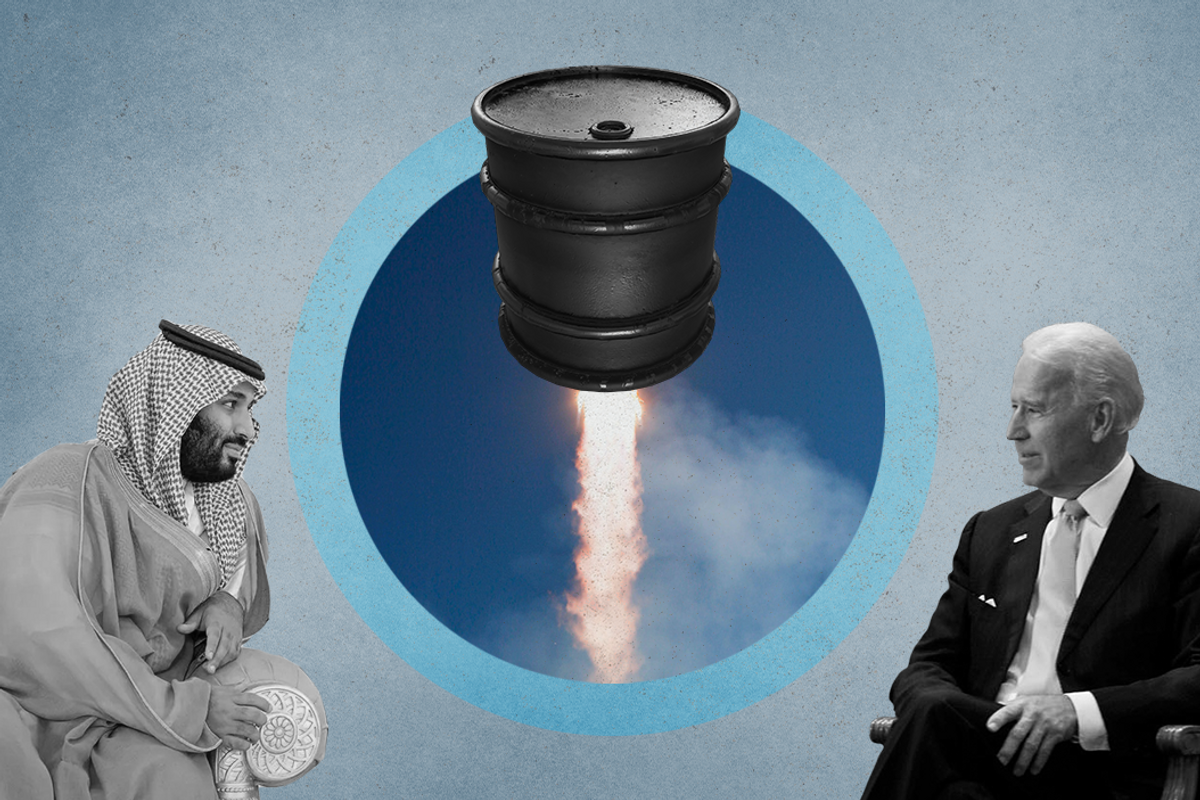As oil prices soar amid the Russia-Ukraine crisis, the US and other Western countries are looking to Saudi Arabia for help. The kingdom is the de facto leader of the OPEC producers’ group and has responded to market shocks in the past by increasing the supply of oil to bring down prices. It has done so partly out of a desire to maintain good relations with the US and to show responsible market management practices. But Saudi Arabia is so far resisting entreaties that it pump more oil this time around. We talked to Eurasia Group expert Sofia Meranto to find out why.
Is it just a question of self-interest?
It’s true that higher oil prices are beneficial for Saudi Arabia and will yield more revenue to support Crown Prince Mohammad bin Salman’s economic development plans. But in addition to that, the geopolitics that underpinned the kingdom’s traditional strategy have shifted. Relations with the US have frayed, and since 2016, the kingdom has sought to coordinate oil production with the larger OPEC+ group, which includes Russia. Russia would surely oppose a production increase meant to help Western countries that have hit it with punishing sanctions over its invasion of Ukraine. Therefore, Saudi Arabia will probably remain reluctant to discuss oil production increases absent a significant political gesture from the US administration, a larger physical disruption to Russian energy supplies resulting from the war in Ukraine, or serious pressure from China — the world’s largest buyer of oil.
Why is the OPEC+ framework important to Saudi Arabia?
OPEC+ offers Riyadh a large block of 23 oil-producing countries to lead, giving it outsized influence over oil markets. Saudi Arabia is the world’s second-largest producer after the US, while Russia is the third. One of the big lessons Saudi Arabia took away from the sector’s challenges in 2020 — which included an OPEC+ breakdown and Russia-Saudi price war — is that cooperation with Russia on energy is mutually beneficial. Disrupting the OPEC+ framework with a unilateral move by Saudi Arabia to increase production would probably be perceived in Russia as an attempt to financially hurt it.
More broadly, cooperation with Russia offers Saudi Arabia the opportunity to diversify its international alliances at a time that US engagement with the kingdom and the wider Middle East is in decline. So, the Saudi leadership is looking to maintain neutrality in the Russia-Ukraine war and a policy that leaves all doors open.
How has Saudi Arabia’s relationship with Russia evolved in recent years?
Riyadh has been exploring and expanding collaboration with Russia on a wide range of areas, from energy, politics, economics, and investments to regional policy and security issues. The reality is that Russia has become a more important player in key regional issues in the Middle East. Notably, Riyadh sees Russia as having valuable influence with Tehran and on incentivizing Iranian behavior, which remains a core priority for Saudi Arabia. And the fact that President Vladimir Putin was willing to meet in public with the Saudi crown prince following the international outcry over the killing of journalist Jamal Khashoggi, in contrast to Western leaders, has not been forgotten in Riyadh.
How has Saudi Arabia’s relationship with the US changed?
Meanwhile, the election of President Joe Biden has dampened US-Saudi relations. Biden has refused to speak directly with Mohammad bin Salman, the kingdom’s de facto leader, because of the Khashoggi case and other human rights issues. The bilateral relationship has come under heightened scrutiny in Washington generally, and the two sides have struggled to align on some regional policy issues and energy questions. Moreover, the US’s chaotic withdrawal from Afghanistan has increased worries across the Gulf about its commitment to the Middle East. The global energy transition and, until now, steadily declining dependence on Middle Eastern oil, have also weakened one of the traditional pillars of the Saudi-US relationship. As a result, Asia is now the most important destination for Saudi oil. More broadly, Riyadh has shown interest in exploring a wider range of international partnerships.
Is there any chance of a reset?
A couple of US officials traveled to Saudi Arabia last month to try to convince the kingdom to pump more oil and the White House reportedly tried to set up a phone call between Biden and Mohammad bin Salman more recently but was rebuffed. Similarly, UK Prime Minister Boris Johnson’s visits this week to the UAE and Saudi Arabia are also designed to soften views on oil policy but are unlikely to lead to a major shift on the part of the Gulf states. The Saudis understand their leverage in the current situation given their spare oil capacity and would likely require a face-to-face meeting between the Saudi crown prince and Biden and a wider conversation about the bilateral relationship before considering oil policy changes. But such a step would expose Biden to domestic criticism and appears unlikely unless oil prices increase more dramatically.






